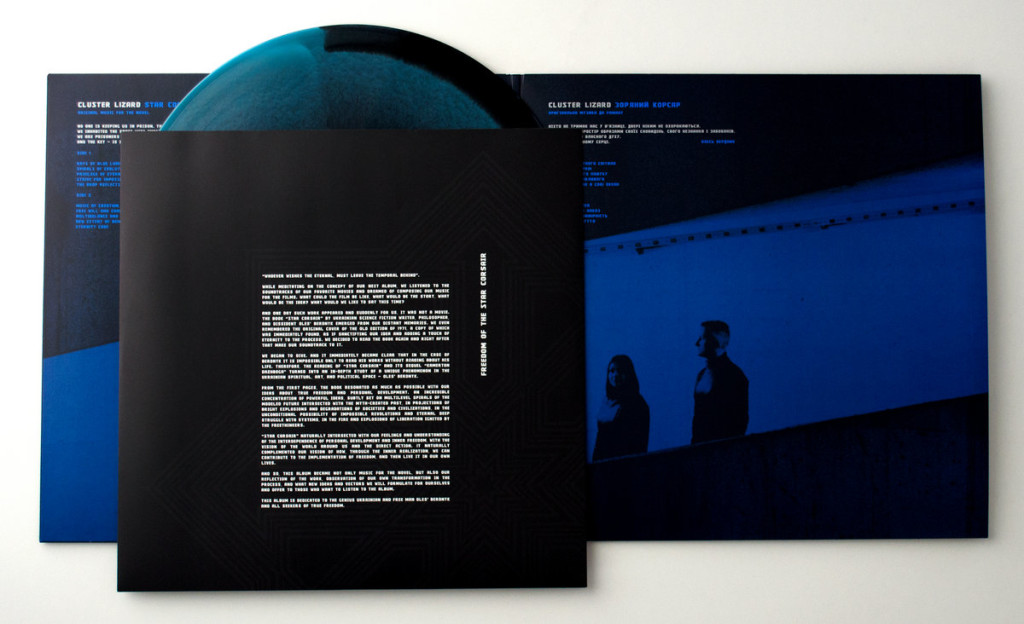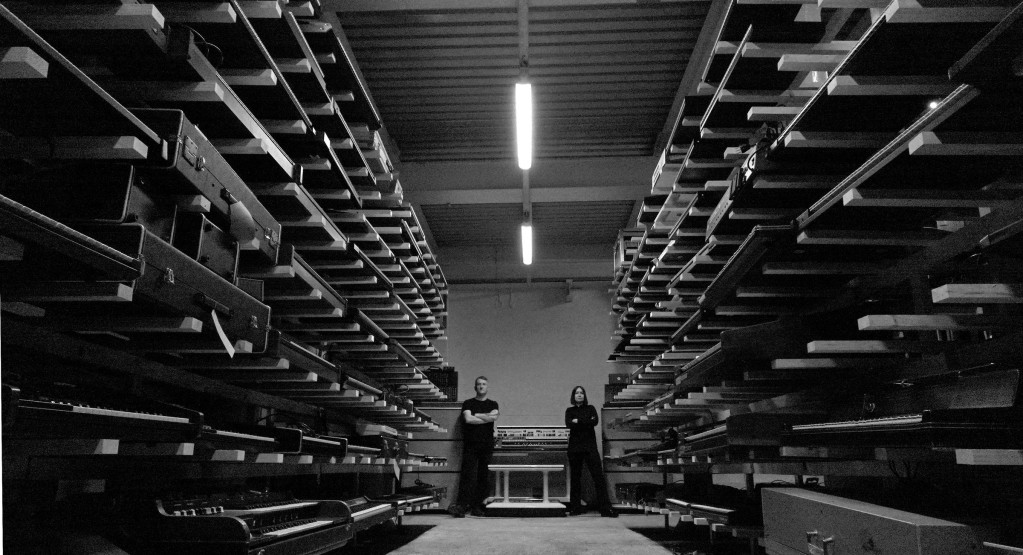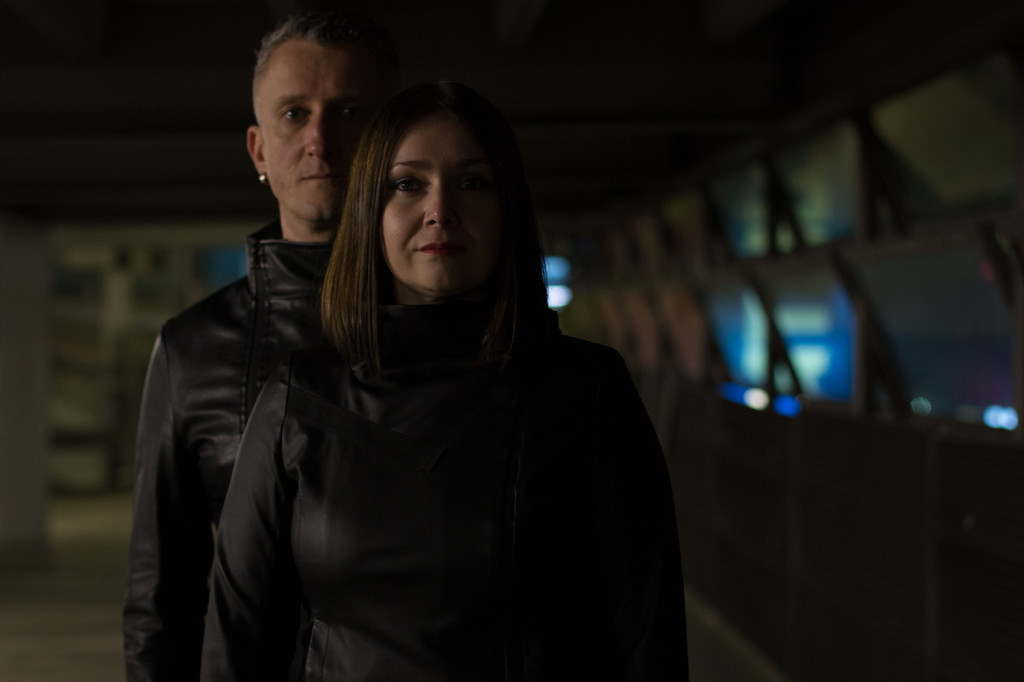Truly imaginative electronic music can let you screen science fiction in your mind’s eye. Dive into Cluster Lizard’s LP, close your eyes, and let their sounds be a score to legendary Ukrainian author, philosopher, and dissident Oles’ Berdnyk.
Cluster Lizard is the duo of Ukrainian sound artists Dmytro Fedorenko and Zavoloka (Kateryna Zavoloka) – each also prolific recording on their own splendid solo projects and running their lab and art space, Prostir. Star Corsair sees the two stretching their sound powers deep into a pulsing, ambient-cinematic expanse, a sumptuously romantic concept album. It’s a warm embrace of 1970s Soviet-era literature, but it’s also unabashedly futuristic – no post-Soviet dust or haze or nostalgiya here. (or rather nostalhiya / ностальгія). This embraces all that is visionary, forward-looking, and defiant in Berdnyk’s legacy – mining it for its 21st-century potential. Even in brooding, dark harmonies and melancholy, there’s a sense of progressive resistance. Even through distortion, the synths all have edge and sheen – they’re not rusting in some shipyard. They’re ready for faster-than-light travel.
Cluster Lizard also made this beautiful video for themselves:
Oles’ Berdnyk, for his part, looked far past the Ukrainian Soviet Socialist Republic, imagining cybernetics as a means for human self-determination and transformation, leading to interstellar contact. Too futuristic for the state, he wound up a political prisoner in the 50s, even alleging torture in his trial, but continued publishing. His first collection of stories, Beyond Time and Space, saw publication the same year as Sputnik’s launch, writing in a vein that drew from visionary Slavic pagan folklore and egalitarian humanism and science alike. That kind of deviation from realism again landed him in trouble – under KGB surveillance in the 70s, the USSR even went so far as to try to ban his books.

But Berdnyk didn’t restrict his idealism to the realm of fiction; as an activist, he was a voice for universal human rights and international freedoms, with appeals to Amnesty International and the UN (and believe it or not, even Pope John Paul II). (He did eventually get a pardon from the USSR during the more open 80s, and got to eventually speak to a freed Kyiv about his notions of the cosmos so – happy ending, for once, folks, unless you feared something else.)
In other words, Berdynk balances science and mystical humanism as an advocate for human rights worldwide, at just the time radical electronic producers might seek such inspiration.
There’s a great biography translated by Roma Franko:
http://www.languagelanterns.com/prometheus_berdnyk_bio.htm
Digging into that fertile ground, Cluster Lizard has been rigorous in working conceptually and philosophically even before they touch any gear. As they told 15questions:
The music of Cluster Lizard is 100% based on concepts created before we turn on the machines.
Here we say again – tools can never stand in front of our ideas. Our tools do help us, yes, as well as bringing their influence and expanding our perception. But we would never build an album’s concept based around a synthesizer or a guitar pedal.

(Heh, I’ll be brutally honest – I respect this partly because I can’t say I have the same discipline! I find after tooling around with synths, I just start to dream of science fiction ideas … but I love the notion of being particular with this order. Maybe we all should try it.)
As they tell CDM, that palette of sounds is so broad because their techniques are also so broad:
“We don’t limit ourselves with the use of tools. We use machines, digital
and analog, and software of course. The difference in this album is that
in addition to our small army of various synthesizers we also used
guitar & bass with a number of pedals and effect processors.”
It’s really beautiful what they have to say about their relationship with the book, so let me just reproduce all of it:
“Whoever wishes the eternal, must leave the temporal behind.”
While meditating on the concept of our next album, we listened to the soundtracks of our favorite movies and dreamed of composing our music for the films. What could the film be like, what would be the story, what would be the idea? What would we like to say this time?
And one day such work appeared and suddenly for us, it was not a movie. The book “Star Corsair” by Ukrainian science fiction writer, philosopher, and dissident Oles’ Berdnyk emerged from our distant memories. We even remembered the original cover of the old edition of 1971, a copy of which was immediately found, as if sanctifying our idea and adding a touch of eternity to the process. We decided to read the book again and right after that make our soundtrack to it.
We began to dive. And it immediately became clear that in the case of Berdnyk it is impossible only to read his works without reading about his life. Therefore, the reading of “Star Corsair” and its sequel “Kamerton Dazhboga” turned into an in-depth study of a unique phenomenon in the Ukrainian spiritual, art, and political space – Oles’ Berdnyk.
From the first pages, the book resonated as much as possible with our ideas about true freedom and personal development. An incredible concentration of powerful ideas, subtly set on multilevel spirals of the modeled future intersected with the myth-created past, in projections of bright explosions and degradations of societies and civilizations, in the unconditional possibility of impossible revolutions and eternal deep struggle with systems, in the fire and explosions of liberation ignited by the
freethinkers.“Star Corsair” naturally intersected with our feelings and understanding of the interdependence of personal development and inner freedom, with the vision of the world around us and the direct action. It naturally complemented our vision of how, through the inner realization, we can contribute to the implementation of freedom, and then live it in our own lives. And so, this album became not only music for the novel, but also our reflection of the work, observation of our own transformation in the process, and what new ideas and vectors we will formulate for ourselves and offer to those who want to listen to the album. This album is dedicated to the genius Ukrainian and free man Oles’ Berdnyk and all seekers of true freedom.

Electronic Music Instruments. All photos courtesy the artists.
Check out that full review for more on their production practice:
Cluster Lizard about Production, Technology and Creativity
[Money quote] “If an AI isn’t motivated by fame, greed, sex, and popularity – why would it develop creativity?”
also nice individual interviews:
Fifteen Questions Interview with ZAVOLOKA
Conceptual as it may be, the album is also a sensory tour-de-force , worth listening and relistening for all its exquisite details – like a sci-fi epic you want to sneak into the theater to see on the big screen again. Sparkly, spacious ambient pads, brutal percussion, buzzing distorted leads threading their way across stereo space – it’s a scoring calling card.
“Rays Of Blue Luminary” plunges immediately into that sonic world, before “Spirals Of Evolution” rumbles forward with nervous anxious energy. “Privilege Of Eternal Search” is a mystical invocation worthy of the Berdynk source material, esoteric polyrhythms etched into metal and humming oscillators and physically modeled surfaces. “Free Will And Command” is satisfyingly menacing, whirring into escalating, dervish-like alarm.

There’s just a constant state of motion and urgency, whereas this kind of sci-fi concept might easily have just settled into pleasing ambient soundscapes – everything off-kilter in a way that demands attention. “Multibalance And Immensity” veers into a kind of braindance-industrial IDM territory that could even soundtrack a rave for smart entranced nerds. For all the feedback-laden granular stardust above everything, there is a persistent, noncompliant drum beat pushing the track forward, on to the triumphant march of “New Extent of Being,” with siren-like dissonant. The brief but beautiful “Eternity Code” closes like a first glimpse of the void at the edge of space.
Have a look at the two of them live:
https://clusterlizard.bandcamp.com/music